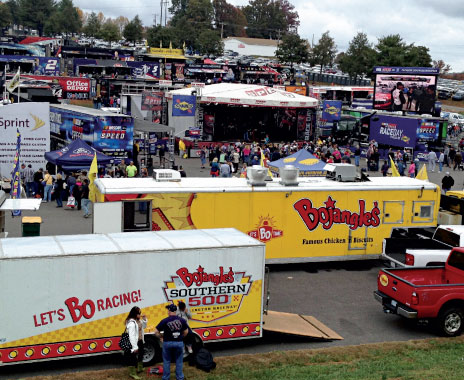Gone are the days of generic overcooked hot dogs and soggy nachos at sporting events. Quick-serve restaurants are expanding their reach to offer basketball, football, and other sports’ fans more familiar, branded foods at stadiums and arenas.
One of the biggest benefits of operating in a sports venue is the exposure it creates for a brand, says Randy Icard, vice president of franchise development for Bojangles’ Restaurants. The Southern quick serve known for its chicken and biscuits operates in a variety of venues home to professional basketball and football teams, including Charlotte, North Carolina’s Time Warner Arena, home of the NBA’s Charlotte Bobcats, and Bank of America Stadium, home of the NFL’s Carolina Panthers. The chain also operates in various college sports venues and NASCAR speedways on the East Coast.
“Since you have a captive audience at an event, you have a huge opportunity to attract new customers to your brand,” Icard says. “Because many of the choices at events are generic foods such as hot dogs or burgers, consumers really appreciate branded products. Regular customers of the brand are happy to be able to eat their favorite foods, and new customers who may have heard of your brand get the chance to try out your products.”
Bojangles’, he says, gets additional exposure from patrons carrying the brand’s bright yellow cups and food boxes throughout a stadium.
Because large hospitality corporations like Aramark and Delaware North operate concessions for many sports venues, quick-serve concepts should reach out to these companies about potential partnerships instead of contacting local arenas or stadium managers, says Steven Brush, cofounder of nontraditional consulting firm iBrandEZ.
When considering venues, brands and franchisees should carefully research exclusivity deals at desired venues, says Vinay Chadha, a mobile cart operator with beverage brand Maui Wowi Hawaiian at San Diego Chargers’ Qualcomm Stadium. Some locations limit the types of brands that are allowed to set up shop, which can mean more work or wasted time for an operator looking to get in quick, Chadha says.
“However, if you locate an arena that lets in multiple operators selling the same type of products, you will have more competition and have to reduce your prices,” Chadha says. He recommends finding a venue with exclusivity rights because operators will net a higher profit margin.
Icard says operators also need to consider locations that are representative of an individual brand. “We recognize that college football, NFL, and NASCAR fans are Bojangles’ customers, so we target these types of venues,” he says.
The number of events at a specific venue should factor into the search for a sports location, too—more events mean a good return on investment, says Chris Burr, director of nontraditional development at Dunkin’ Brands. “It can be harder to meet expectations if you are operating out of a single-purpose NFL stadium with only 12 games a year than a multipurpose arena that hosts many types of events throughout the year, such as basketball, hockey, and concerts.”
Dunkin’ Donuts has a presence in Boston’s Fenway Park, home of the MLB’s Red Sox; Washington, D.C.’s Verizon Center, home of the NBA’s Washington Wizards and NHL’s Washington Capitals; and other East Coast venues. Each of its venues caters to an audience of consumers readily familiar with Dunkin’s drinks and treats.
Burr says brands must pay careful attention to sponsorship agreements required of a food vendor, as they are often mandatory and non-negotiable. “We prefer that our sponsorship agreement is separate from our franchise agreement to prevent conflict,” he says.
Even after securing a location, operators can face a challenge in selecting the right menu items to offer. Icard says to “pick four to five menu items that are really representative of your brands that you can execute at a high level, and only offer those at the locations.”
To provide convenience to attendees, Dunkin’ Brands sells its specialty coffees at nonbranded concession stands and offers its other products as upgrades in club-level boxes and seats.
When determining a menu, inventory control should be a large factor in the decisions as well, Brush says. “If your menu has a high percentage of fresh products, then you need to determine what to do with the food when the venue is not in use,” he says. “Be sure to take this into consideration when determining your menu to reduce the amount of products that you have left over since you may go weeks between events, especially at college or NFL stadiums.”
Appropriately staffing events is another key to creating a positive experience for new and returning customers, Brush adds. “You need a flexible staff that can work when you need them,” he says. Venues close between seasons, and games can be canceled because of weather.
Icard says operators must make sure their concession stand is organized to handle the fluctuations in traffic volumes. “In the hour before the event, you are going to be very busy,” he says. During the event, sales will be much slower, but will immediately pick up during a break.
“When operating in a nontraditional venue, it’s essential that you don’t leave any details to chance and make sure that you can execute your food and service at a very high level with products that represent your brand,” he says.




